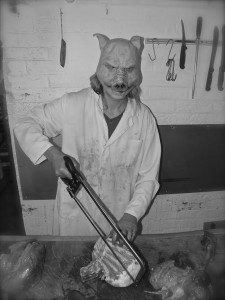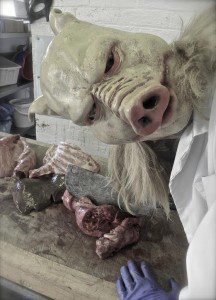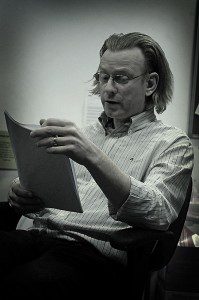Joseph D’Lacey is best known for his shocking eco-horror novel MEAT. The book has been widely translated and prompted Stephen King to say “Joseph D’Lacey rocks!”. He is also the author of the This Is Horror chapbook, Roadkill. This Is Horror sat down with Joseph to talk about the rerelease of cult classic, MEAT.
The newly packaged novels promise additional content and enhanced eBooks. Can you detail the specifics as to what we are going to get which we didn’t get the first time around? What’s on offer for fans who already own the originals?
The eBooks will contain video files in which I’m interviewed about various aspects of the material.
For all of the formats the novels have been professionally proofread – this was an issue especially in Garbage Man. Both books have been re-appraised by independent readers and I have edited them in response to comments from them and my agent.
As well as the new covers – which I adore – I’ve written a new preface for MEAT and an afterword for Garbage Man. Each title has been typeset anew, with new fonts and layout. Basically, both titles have been reinvented and I’m delighted with the amount of work that Andrews UK have put into them.
We also understand there will be an audio version of MEAT. How will this differ from the previously released audiobook and who do you have lined up to narrate? Will Garbage Man also receive the audiobook treatment?
The audio rights in both novels have been sold to AudioGo. They have their own new thumbnail covers now and we’ve auditioned narrators.
I can’t confirm the specific reader’s acceptance yet, but we have chosen one. I can tell you that he is male this time and has a brilliant, penetrating Scottish accent. Assuming all goes smoothly, both audio titles will be released not long after the launch of the new print and eBooks and they’ll be narrated from the newly edited versions.
 Abyrne in which MEAT is set has a small town religious cult feel, not dissimilar from The Wicker Man and more recently Kill List. There are also covert and overt references to religion. What inspired the town and locals of Abyrne and how important is sense of place in MEAT?
Abyrne in which MEAT is set has a small town religious cult feel, not dissimilar from The Wicker Man and more recently Kill List. There are also covert and overt references to religion. What inspired the town and locals of Abyrne and how important is sense of place in MEAT?
While I have no affiliation to or involvement in organised religions, I’m very focused on the spiritual aspects of day-to-day life. The havoc that religions have wreaked on humanity both fascinates and horrifies me and it’s incredibly fertile ground when it comes to writing fiction. The same is true of corporate power – just as hierarchical and controlling and equally far-reaching. It’s hard to decide which camp I mistrust the most.
I pitted them against each other in MEAT and it seemed to create an atmosphere and environment that was oppressive in every possible respect – hopefully, the perfect setting for this particular tale.
Tell us a little about the protagonist Richard Shanti and how his morals both protect and adversely affect his family? Is this done to show the difficulties in attaining moral blacks and whites in a world of grey?
Shanti is trapped in a world not of his own making. Like Neo in The Matrix, he is asleep but wants to wake up and finds a way to do so. In attempting to protect his family morally, he ends up physically endangering them. It’s what happens when you stick your head over the parapet and make a stand. For his tale to have meaning, he had to risk everything for what he believed in, even those he loved most dearly.
You can put blacks and whites into books – that is sometimes the result of exploring difficult subjects in fiction – but the world itself remains painted in shades of grey. There is no ultimate answer, no final definition of right or wrong. In day to day life, what matters is one’s own interpretation of the reality one perceives and one’s response to that. That’s not something you can standardise with any kind of morality, religious dogma or hard reasoning.
Books are like dreams or signposts; they may or may not point you in the right direction. As I’ve said before, though, the most important thing is that they entertain. Shanti’s moral dilemmas are secondary to whether or not readers are drawn into his story and transported by it.
A particularly creepy but often overlooked scene involves the dissecting of dolls to prepare meat for a ‘party’. What was the genesis for this?
I wanted to imply that the children were beginning to pick up and accept Abyrne’s societal edicts as ‘normal’. A scene in which they played out a meal for their toys seemed a good way of doing that but it wasn’t something I’d planned. It struck me as I sat down to write on that particular day and ended up doing just enough to make the point, I think.
Two stand out characters are John Collins and Rory Magnus. Are they based on any real life figures?
I know it would be more interesting to say they were but they aren’t, I’m afraid. It’s incredibly rare that I would take a real person and use them as a template for a character. I may have done it once or twice in a dozen or more years.
It’s a personal thing again, but I’m much more interested in a character whose existence serves the story. So it’s very unusual for me to create a character first and build a story around them. I tend to get an inkling of what I want to investigate and a character will come along whose existence in that world allows the story to come to life.
Hell, I have no idea if that makes any sense or not! The point is; it’s story first, then character. And almost never characters from real life!
 What advantages and disadvantages have you found from abandoning social media? What effect has this had on your website’s hits and have you noticed a rise or dip in sales? Are there any other measurable stats as a result of no social media, perhaps in terms of word count and writing output? How do you feel on a creative level?
What advantages and disadvantages have you found from abandoning social media? What effect has this had on your website’s hits and have you noticed a rise or dip in sales? Are there any other measurable stats as a result of no social media, perhaps in terms of word count and writing output? How do you feel on a creative level?
The short answer is that not being on social media is bliss. At least for me.
I feel placid and focused – on whatever requires my attention – and I have plenty of time to think. When I’m working, there are fewer distractions and when I’m not, I don’t waste time planning what I’ll say in my next tweet or status update. I didn’t realise before how often such trivialities were on my mind.
I used social media for promotional purposes and no other. It was something Beautiful Books requested I do. But in terms of sales or the virulence (or not) of the content I generated, I’d say after six or seven years that the impact my presence had was negligible.
It’s very different if the public is already aware of you. In that situation, you become accessible. People like that. But to begin as no one-in-particular and attempt every day to invent your own someone-in-particularness, to persuade others to buy what you’re selling; that’s hell on earth. And the way social media works means that you end up trying to sell what you’ve got to other people trying to sell much the same thing to you. I’m so glad that’s all over for me. And I’m content to remain no one-in-particular as long as I can do my work and enjoy my life with an uncluttered mind.
Creatively – again this is just for me – being free of social media is gold. Pure gold. And, as an odd side-effect, it appears that when I blog now, more people visit and click through to whatever I’m wittering about. Result.
I’ve no wish to criticise social platforms, even though personally there were many things I disliked about them. I can see that for many people, they create a genuine sense of community and a way to share life events and news in a vibrant and instant way. But for a writer like me, who’s easily distracted and finds self-discipline a daily issue, they’re no help at all.
MICHAEL WILSON
If you enjoyed our interview with Joseph D’Lacey and want to read more of Joseph’s fiction, please consider clicking through to our Amazon Affiliate links and purchasing a new book today. If you do you’ll help keep the This Is Horror ship afloat with some very welcome remuneration.
Buy Joseph D’Lacey fiction (UK)
Buy Joseph D’Lacey fiction (US)










1 comment
Good intereview, Mr D. Looking forward to the re-release.